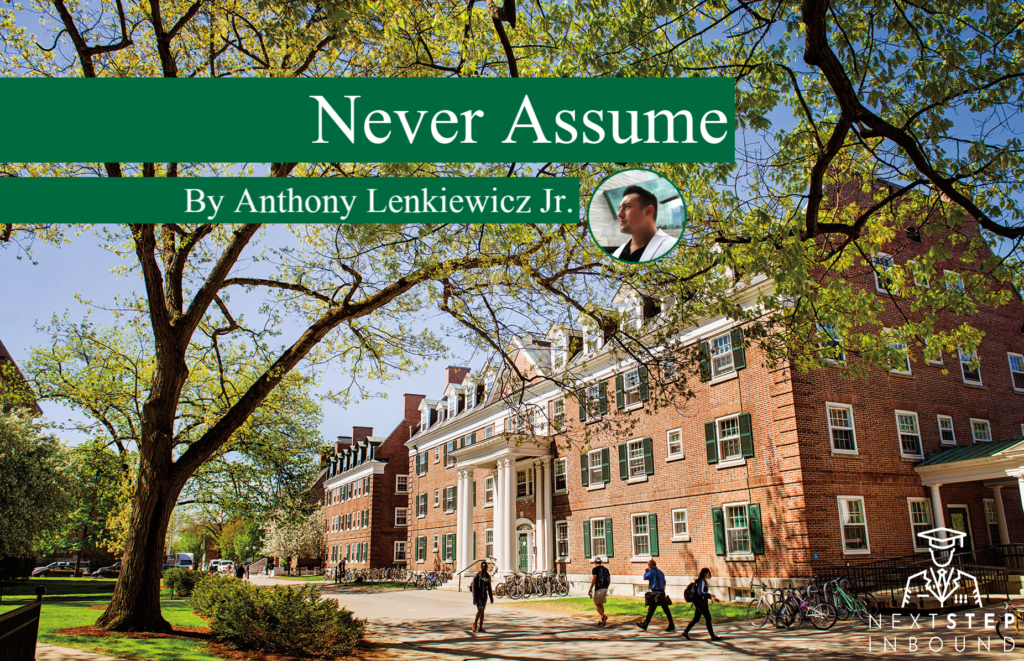
One of my favorite teachers at the Lutheran elementary school I attended had a habit of repeating a specific phrase out loud when things didn’t go according to expectation: “Never assume.” It’s been burned into my memory, and now I repeat the same phrase out loud to myself.
In my hometown of Hemet, California, there are streets named after many prestigious colleges. My favorite taqueria was, and still is, on Yale Street. Driving past Dartmouth Street meant my family and I were halfway to church. Go one block further east to Stanford Street, and you’ll find Hemet High, home of Bulldogs. And crossing Harvard Street meant you were downtown. I knew most of these streets were named after far-away elite colleges on the other side of the country. And seeing streets named after these legendary schools only further mythologized them in my young mind. To me, these were the schools of the academic gods, their distant campuses hallowed ground. Even then, I recognized these schools as not only incredibly difficult to get into, but I also thought of them as reserved for students quite unlike me—students from privilege who grew up in a Battle Hymn of the Tiger Mother type home. I assumed I would never set foot on a top school’s campus, let alone attend an Ivy League school.
Throughout all of high school, I was convinced that I didn’t want to go to college. I was comfortable with the idea of learning a trade and working hard to earn promotions and recognition. It’s not that I didn’t like the classroom or learning through lectures and readings and seminar-styled discussions—it was mostly that I just had no idea how to go about applying to college or paying for the notoriously large tuition bills. And how would I know which school would be a good fit for me? While going to college didn’t seem like it was for me, I knew a real and tangible option for a career was the military. Growing up in southern California exposed me to seeing countless Marine Corps and Navy amphibious assault vehicles, aircraft, ships, sailors, and marines. Not only was the military a very real possibility, but it was a very visible and inviting option. So, it was only a couple of years after high school before I found myself walking into the Coast Guard recruiting office, finally ready to make the big leap.
Six years of enlistment went by quick. After a sweltering summer boot camp experience, the Coast Guard had taken me from Maine to California to the Caribbean and many places in between. Even though I worked in IT, I took part in search and rescue missions, maritime law enforcement boardings, migrant interdiction, interception of drug-traffickers, and endless shipboard drills. I loved my Coast Guard experience but eventually realized the college experience was something I really wanted. If I stayed in the Coast Guard, I knew I would regret not having gone to college at a four-year institution. It turns out the classroom was for me after all. And since Uncle Sam was going to cover the tab with the Post-9/11 GI Bill, it was far too good of a deal for me to pass up.
One day, I was looking into different schools that I might be interested in applying to and taking detailed notes. The clock was ticking for application deadlines, and I had to really think about what I wanted in a college experience. Would I enjoy going to a Big 10 or Big 12 school? Did I want to return back to the west coast? Was I interested in a small rural college or a large urban university? Did rankings matter for my future interests? Where could I use the Post-9-/11 GI Bill? Curious about what schools might be best for veterans, I eventually stumbled upon an interview of a prior-enlisted veteran student talking about his experience at college. Much to my surprise, after serving in the Army, he was now a thriving student at Cornell University. Was this guy just a super-smart over-achiever who took a detour on the way to college? Or was it possible for regular veterans to attend a school like that? If he could do it, why couldn’t I? It was a stunning revelation. Essentially, it took me seeing another veteran doing what I thought was impossible to make me realize that top colleges not only accepted, but actually wanted veterans like him and like me.
Before I learned that there were many veterans in the ranks of the world’s top colleges, I had always assumed that getting into them was akin to winning the lottery…not in the sense of suddenly amassing a fortune but in terms of probability. In reality, thousands of people get accepted to top colleges every year while few win the Powerball or Mega Millions. Nevertheless, because of many factors within my childhood environment (like class, ethnicity, geography, community, and more), I assumed that the probability was radically not in my favor. Dreaming big, therefore, wasn’t practical, nor did it seem to have a high return. If I didn’t see my peers going to top colleges, why would I think that I could get into them? Eventually, with the help of amazing organizations like Service to School and The Posse Foundation, assumption gave way to “seeing is believing” when I saw that I could bring value as a student to a venerated institution. I had assumed that a quality education at a top college wasn’t for me. But I was wrong. And that’s why I am so proud to be a part of an organization like NSI to prove the opposite is true. Never Assume.



